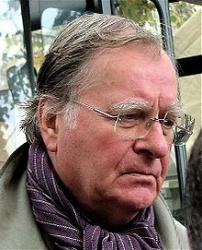Planning worship?
Check out our sister site, ZeteoSearch.org,
for 20+ additional resources related to your search.
- |
User Links
Search Results
We Live Not For Ourselves
Appears in 2 hymnals Hymnal Title: Calvin Hymnary Project
We Live Not For Ourselves
[We live not for ourselves]
Appears in 2 hymnals Composer and/or Arranger: Floris van der Putt; Bernard Huijbers, b. 1922 Hymnal Title: Journeysongs (2nd ed.) Tune Key: A Major Incipit: 11765 61165 45566 Used With Text: We Live Not for Ourselves
[We live not for ourselves]
We Live Not for Ourselves
Author: Huub Oosterhuis, b. 1933; Tony Barr, b. 1945; James Hansen, b. 1947 Hymnal: Journeysongs (2nd ed.) #773 (2003) Hymnal Title: Journeysongs (2nd ed.) Topics: Christian Life; Eternal Life/Heaven; Meditation; Retreats; Christian Life; Eternal Life/Heaven; Meditation; Retreats; Christian Life; Eternal Life/Heaven; Meditation; Retreats Languages: English Tune Title: [We live not for ourselves]
We Live Not for Ourselves
We Live Not for Ourselves
Hymnal: Singing the New Testament #144 (2008) Hymnal Title: Singing the New Testament Scripture: Romans 14:7-8 Languages: English Tune Title: [We Live Not for Ourselves]
We Live Not for Ourselves
Huub Oosterhuis

1933 - 2023 Person Name: Huub Oosterhuis, b. 1933 Hymnal Title: Journeysongs (2nd ed.) Author of "We Live Not for Ourselves" in Journeysongs (2nd ed.) Hubertus Gerardus Josephus Henricus Oosterhuis (born 1 November 1933, Amsterdam) is a controversial Dutch theologian and poet. He is mainly known for his contribution to Christian music and liturgy in the Dutch language, used in both Protestant and Roman Catholic churches, although there is much Catholic opposition to his work, which has resulted in the banning of several songs in certain dioceses. He is the author of over 60 books and at the time of over 700 hymns, songs, Psalms (often in an own interpretation), and prayers.
Oosterhuis was a Jesuit and is a Roman Catholic priest.
In 1954, inspired by Che Guevara who said that churches have the potential to transform the social structure of society, Oosterhuis combined his priesthood with political activism.
In 1965, Oosterhuis became one of the major supporters of ecumenism, following the modernist interpretation of the Second Vatican Council. He started out to rewrite the liturgy and make it acceptable to all. Some of his changes were considered controversial within the Roman Catholic Church especially writing the prayer for agnostics: "Heer, als U bestaat, kom dan onder ons" ("Lord, if You exist, come amongst us").
His political views, the conflicts regarding the liturgy and his dismissal of celibacy led to Oosterhuis being expelled from the Jesuit order in 1969. He still however remained working as a priest, running his church in Amsterdam out of the responsibility of a bishop, at the time for about forty years. He is still focussed on writing liturgy, poetry and essays.
Back in the sixties and seventies his liturgical texts were put to music by his fellow former Jesuit Bernard Huijbers (1922–2000). The co-operation between Oosterhuis and Huijbers ended. The last engaged himself more and more in a 'spirituality-without-God' or '-Thou', whereas the former kept to his biblical prayers, hymns, psalms. After they both split up and Huijbers moved to the South of France Oosterhuis' main composers were two of Huijbers' pupils, Antoine Oomen (born 1945) and Tom Löwenthal (born 1954).
Oosterhuis founded the discussion center "De Rode Hoed" ("The Red Hat") in Amsterdam in 1989. The building was a former Remonstrant shelter church, hidden because Remonstrantism was outlawed in the 17th century. The building was more or less deserted at the time. Oosterhuis wanted to use it for his student organization (1990) and create a discussion center. Its nice interior made it also very suitable for TV-shows. After a short period Oosterhuis was replaced by a managing-director for a more commercial exploitation of this prominent building in Amsterdam's Canal zone.
In 2002 Queen Beatrix of the Netherlands asked him to deliver the eulogy at the funeral of her Prince-Consort Claus von Amsberg, a longtime personal friend. The New Church in Delft was packed with heads of state, high dignitaries, forming an unexpected audience. That same week the Protestant VU University in Amsterdam granted Oosterhuis an honorary PhD (or Doctorate) in Theology.
It was at De Rode Hoed where André van der Louw announced his Social Democratic Renewal Program which was an incentive to reform the Labour Party. Oosterhuis ultimately choose the lesser known Socialist Party as he viewed it closer to socialist ideals. He also opined that The Socialist Party is closer to the social ethics of the Bible than many Christian parties."
In 2006 elections Oosterhuis stood as final candidate, a symbolic position, for the Socialist Party.
Oosterhuis translated the Torah together with Alex van Heusden, which was released in five separate books, as an attempt to translate the first five books of the Bible as close to contemporary Dutch as possible without losing the style figures of the original Hebrew text.
Huub Oosterhuis is the father of the musicians Trijntje Oosterhuis and Tjeerd Oosterhuis.
Only a very few books, poems, verses of Huub Oosterhuis were translated into English: Fifty Psalms, Your Word is Near, At Times I See, The Children of the Poor Man, Wake Your Power (CD) - some more.
--en.wikipedia.org/wik
Huub Oosterhuis
James Hansen
b. 1937 Person Name: James Hansen, b. 1947 Hymnal Title: Journeysongs (2nd ed.) Translator of "We Live Not for Ourselves" in Journeysongs (2nd ed.)
James Hansen


 My Starred Hymns
My Starred Hymns


